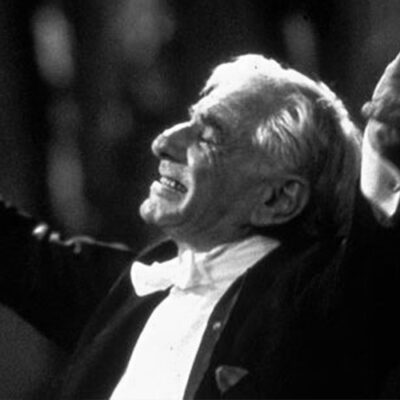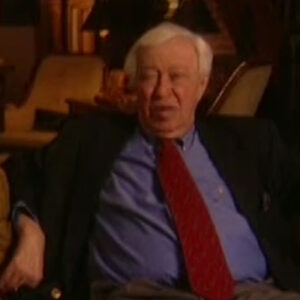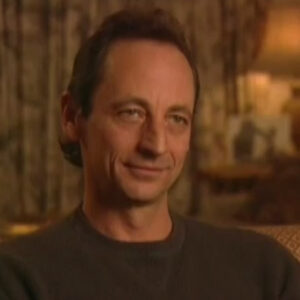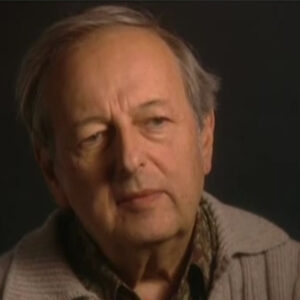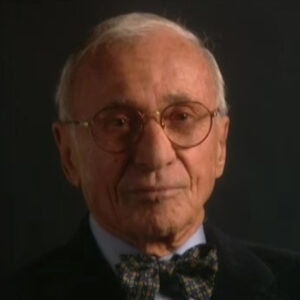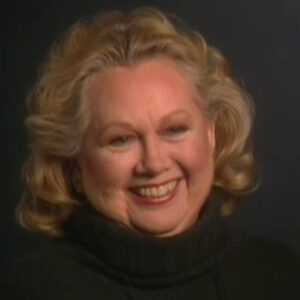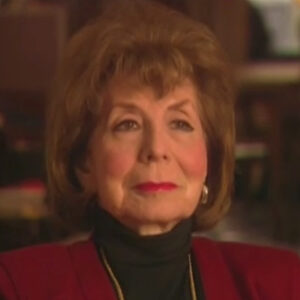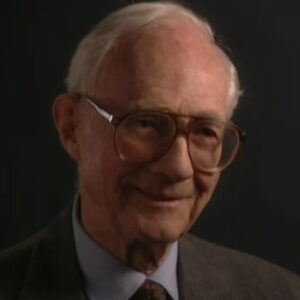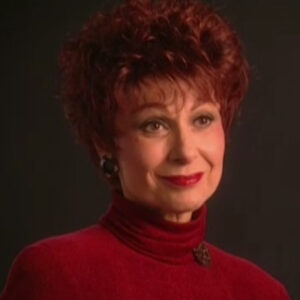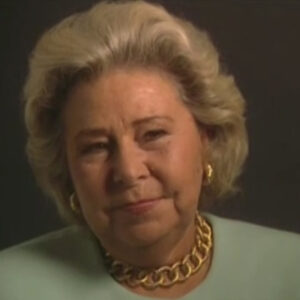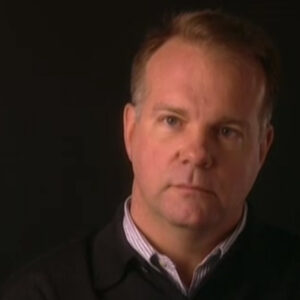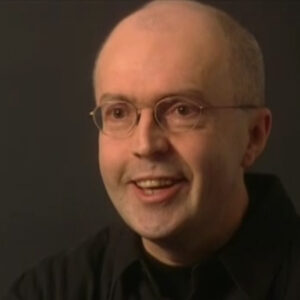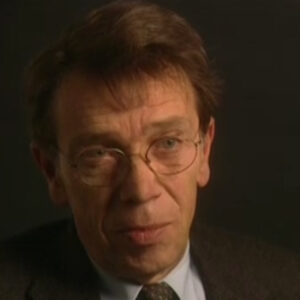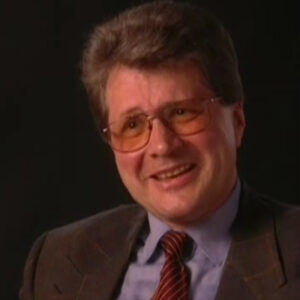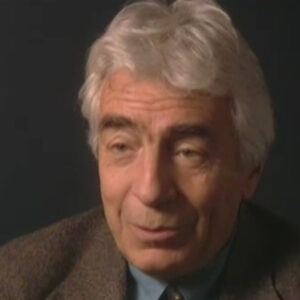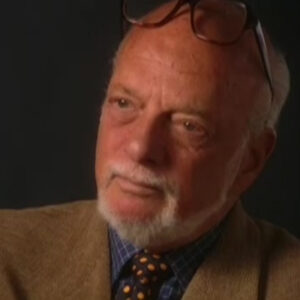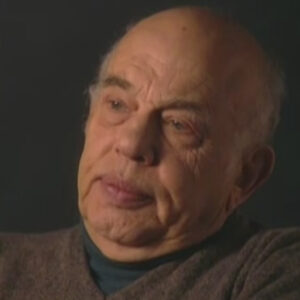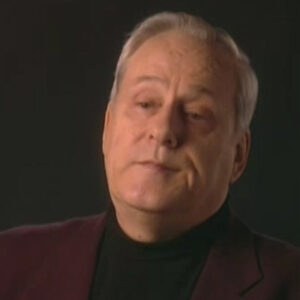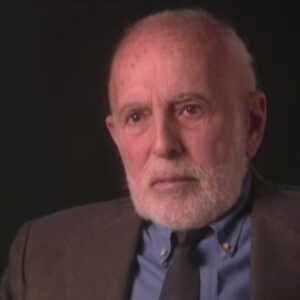Speaker Well, this is 1943. We come in one Sunday, we always had the Sunday afternoon concerts, we had to rehearse the whole week with Bruno Volter and.
Speaker Being young myself, I would know exactly when to come in for the orchestra, I would be there five or six minutes before and sit down and know I know what the program is going to be. So we’re ready to play well, this day we come in and they say, oh, did you hear what I said? Hear what? Because I wasn’t there that early universalities sic. And Leonard Bernstein was the assistant he was always in the in the audience following making sure in case somebody did get sick, but there’s no time for rehearsal, they said, and he’s coming to do the concert, that this was about five to three or ten to three. Well, outcomes, this gorgeous man, I mean, let’s put it this youngster of 25 gets on the podium, gives a downbeat and bedlam went because this was I’ll never forget that experience because was the most exciting performance to me of the Manfred Overture that I ever played in my life. And they said, well, he was very nice. I said, well, I tried to do what Bruno Walter did, but with no economic boom, the world had his way of conducting the Manfred Overture and Lenny was Lenny. And when he conducted it, you knew that he was the beginning of a great start of a great conductor. There was no there was no there was no false modesty about him because he came out with that assurance. I mean, somehow you you feel that and the chemistry that immediately set in, you must remember these musicians that I’m 43.
Speaker I just finished with Toscanini. So they were kind of say, well, you know, I mean I mean, after Toscanini, everybody is sort of good, but not quite.
Speaker And they went wild. There wasn’t. And these were all I mean, they knew my experience in orchestras only about four years and different orchestra. So they knew what a great conductor was.
Speaker Could you just say that again and just say we knew?
Speaker But knowing just that last sentence, Acamprosate, we knew or we know we knew that this was a great conductor. I mean, and we recognize the idea that even as a young man and I had played I had played with Fritz Reiner. This is the beginning of my my orchestral career in 1939. And near 40, 43, I was in the Philharmonic. And this this man was standing that I thought, I can’t I can’t use it. Shall I give that an analogy with the. Well, people asked me just how what I can compare it to. I said being a baseball fan, I can only say that here you have New York Yankees with Babe Ruth and Lou Gehrig all ready to play. And one day Babe Ruth gets sick. And then this rookie who nobody pays that particular really attention to is told, OK, Babe Ruth, I think you’re hitting for him. Well, this youngster gets up. A pitcher throws the pitch. He swings and he connects and hits the ball the minute that the left the bat. You knew that was going to be a home run. But what made it extraordinary? It wasn’t just a home run. It was out of the park, which is really unusual for a baseball player and would go for a conductor. So that’s the only way out. This is how I can compare it to show the the the greatness of this young man at that time when he came out and knew it was announced.
Speaker You all knew him, of course, because he’d been the assistant.
Speaker We knew him only. Well, I can only speak for myself that maybe others might have known him a little more. Maybe because like first men, they associate with more with what? Even if he was his assistant. But I knew he was always sitting in the in the orchestra as an assistant and he had to look at the score to make sure in case of the conductor want to know if it’s too loud or too soft so that he can give an opinion.
Speaker But personally, I did not know him. But as I said, the when he came out, you know, Lenny. I could never say that he was very modest and he didn’t have to be the point. He knew that he was good and it wasn’t the kind of modesty.
Speaker I wasn’t kind of the assurance where you think, well, I’m a great conductor and nobody else does. There’s a difference. This was a great conductor and everybody else agreed. And that that was Lenny. And as I said, his appearance never hurts. And the chemistry. What that word means is so difficult to explain, something happens when you play with a conductor that way that you play way over. I mean, you don’t even realize that you’re playing that. Well, it just. Pours out of you musically, I mean, we all assumed that the notes are always there, but musically you rise to a higher level and this is what this man was always able to do right from that first time. And then I didn’t play with him until I came back, the Philharmonic in 64. And those those experiences were well, they will always live as long as I’m alive, they’ll always be in my my head.
Speaker The describe what happened at the end of life. I think I read the musicians where they were hugging.
Speaker Well, is is he as I said before, I did not know him personally and I was young. So the new kid on the block, I was there only the first second year.
Speaker So you could give that to me in a sentence that you were the youngest member of the New York Philharmonic.
Speaker I’m not like, oh, well, I was I was one year older than Lenny. So naturally I felt I’m a singer, however, not senior enough for me to become an intimate. So I did not I, as I said, excited and I was overjoyed. But it was the first men. I mean, they had the prestige and it was more important basically for them, for these people to give their opinion or be so enthusiastic about Lenny. And they were they all surrounded him backstage. The audience went wild. So and I just packed my fiddle and and I went home because I just didn’t feel.
Speaker I just didn’t feel that it was for me to be a part of it at that moment to reclaim them, but that didn’t didn’t make any difference because was it unusual for musicians to gather around a conductor and hug him and all that after a performance?
Speaker And now that you know it, because, well, it was.
Speaker It isn’t unusual when when they are so impressed. For them to go and tell the conductor what is unusual, that since they were so much older on away in the 40s or maybe 45 to be so impressed with a young man, I mean, I’m 25 years old for a conductor is it’s not it’s not a very, very great age.
Speaker And that’s kind of a conductor that could produce an electric shock the first time he goes up, no rehearsal, nothing hear the downbeat comes. And as I said, I. I just sat there. I can I can only tell you that the only other experience I had with that later on was when Toscanini came to a pension fund concert. I had never played with Toscanini. Well, he came home only compare because he was almost the same. I was there now I think to you a little longer. And he came to do a pension fund concert and he started with the Pines of Rome. And after the first four bars, I mean, this shows that the peculiar person I was, I stopped playing and I said to myself, is this the same orchestra I’ve been playing with for two years? I never heard it sounds it was. He didn’t say a word with that, but. Lenny was a different kind of conductor. He came not not just the also Toscanini also had that chemistry, too, but Lenny was with was lovely to look at on top of it, which helped. So I can only compare these with the two most. Not a, you know, exhilarating, exciting experience, my own music career.
Speaker Toscanini and I know that it’s very difficult, as you said, to to describe chemistry, but what do you think it was in Lenny’s musical approach that produced this result in the musicians?
Speaker Well, to be a great conductor, you have to really be a great musician to. And at 25, you already had that instinctive feeling for making music, making great music, because as he got older, it became even more mature, you do to mature when you get older. But if it doesn’t, if you don’t have it when you’re young, you never you never really develop. It gets better, but it’s never really great. This was great and got better when I came back to the audiences, Mahler’s Symphony, Haydn, it was it was extraordinary. I mean, it just I enjoyed those years very much with him, sometimes not so much, because Lenny could could be not difficult, but he would be so intense. And at that time I was a lot older, so intense that he kind of made me a little more tired. But it was it was always there. So that’s the only part I feel you saved. What could I criticize about Lenny? That’s all that he was so all the time that sometimes you just as you grow not up to it, especially at rehearsals or not at concerts. But he demanded the same thing at the rehearsal as at the concert. And sometimes you just were not adequate from being in the mood, but you just couldn’t give all that you could at the concert. But otherwise, these said these years with Lenny were a wonderful experience. I’ve been very lucky. They like to be the right place at the right time.
Speaker But I wanted to more questions about the debut when when they first announced that Larry was going to be substituting for being involved. I read that some people there was kind of a ground and some people actually got up and left.
Speaker I honestly, I can’t say that I remember that. But not to repeat myself, I said these people I just come from, you know, eight years or so of Toscanini and Toscanini was much older and a great a great conductor. And here this young kid, I mean, you have to call me Kid 25 is going to conduct themselves. So there might have been some say, oh, my God, what? We’re having a youngster. Oh, well, I mean, it’s part of the job. Nothing we could do is we have to play. And actually we’re getting paid. We play.
Speaker So the audience or the audience, I think audiences. What this. Yes, I would think they were disappointed because everyone involved was great conductor.
Speaker There’s no there’s no question different different type of greatness. But there was an outstanding exception to this way. So if you want to want to see, let’s say, Rex Harrison in My Fair Lady and you have a substitute that day, some people go and say, I want my money back because I went there. I paid to see Rex Harrison. So there might have been some disappointment, but that didn’t last very long, because after that first overture, the year immediately, I mean, from then on, it was just uphill all the way where people really cheering the audience.
Speaker Can you describe what people what the audience really cheering?
Speaker Oh, yes. There’s no definitely. Yes, if I remember correct. Don’t forget, this is now in the 43 that’s 55 years. But I believe. Yes. And the orchestra cheered. Let’s put it this way. I don’t know, maybe I didn’t hear the audience here, but the orchestra cheers. They actually cheered. And that would be unusual for for a mature orchestra at that time to cheer a youngster because they didn’t they were very musicians and they were a little different.
Speaker They acted the way they felt and the Philharmonic, if they didn’t like the conductor, well, I just leave. I just leave it at that. So here this was this was a I don’t remember anyone who didn’t say I wouldn’t not open-mouthed at the end. At the end. And as I said, then the rest of their program, they don’t said the impact of that first overture carried through the rest of it didn’t have to warm up. It didn’t have to get better. But it from the beginning to the end is there.
Speaker I read that there’s something very tricky about the downbeat in the benefit of it. Sure.
Speaker Well, if if I can say the difference between conductors today, the young conductors today and conductors. Years ago, outside of Toscanini and Fritz Reiner, yeah, sometimes downbeats could be tricky because each day had a different different you know, some conductors are so exact, like Toscanini, Reiner, Reiner would just do a twitch, which of the wrist? And you would come in. It was incredible. Others seem to have to wind up. And here, here, here is the downbeat. So, Lenny, at times, if there was anything I would say about conducting that was not a task in any type of conductors.
Speaker Sometimes the clarity, but that had nothing to do with what I’m talking about. Different that Mahler symphony, sometimes with becomes intricate, but not the downbeat for that.
Speaker Now, he came up there, set up, looked around, and that was it. So there was no there was no tricky downbeat at that time. It went absolutely perfectly.
Speaker No idea was telling. I didn’t know this that you also performed with, uh, with a fancy free.
Speaker Yes, I did. I mean, those who say I left the Philharmonic in 46 and I came back in 64, and during those years I went to what they called freelancing. I was when the original ballet theatre with Lucia Chase started with Ethel Girardi, who was the conductor. I was the concertmaster. And I remember I don’t remember which ballet it was that Lenny I think it was that ballet when Jerome Robbins did the choreography and Lenny conducted his fancy free. So then but that that don’t forget you must remember that quite a bit later. So he was already a composer and I would expect them to be assured not it’s not the same. And then he was he was known not only the prestige was already very high and it was a yes, it was enjoyable. It’s not the same as doing a Manfred Overture, Mahler’s symphony. But it was it was always enjoyable to work with. Lenny was always pleasant, I must say, always pleasant in those years, especially with with orchestras, that he just came up for the first time. Because I think it’s important that when you go to an orchestra first time, if you’re too authoritarian, that they may they may resent it. But he knew how to achieve what he wanted with with with anyone they want. He had. And he said he was charming. He had that charm that that you’re born with. That doesn’t you you don’t create that that’s there. So I did I did play. I played. I think also it looked as far as what we just played the songs, played the piano. I don’t remember the symphony where he was a soloist. And then he conducted also a ballet, but I played played that constitutes. So I did work with Lenny during the years. I don’t know. We probably know me in the orchestra because he I think when I auditioned for him, he remembered that I had that I played with him, in fact, so that Lukas Ford said, well, yes.
Speaker I mean, yes. So. How shall I put it, it was it was like finally, I imagine, a culmination that he worked with with Metropolis Metropolis and then he became he was became the conductor, the regular conductor of the Philharmonic. And it was definitely something he deserved. And I believe I told the other young lady that I think that let let’s forget now about this great talent as a conductor.
Speaker Or even his great talent as a musician. He sold music, my children couldn’t wait to see those children concerts and there’s anything they learned about music was from Lenny and I think the proliferation of orchestras that happened after those years with due basically to Lenny. So let’s leave all the other things out. That alone to me, I yes, I can only speak for myself. Would have been it was a great creator of orchestras because people flocked to classical music and classical orchestras. So he is a man and is speaking at a mellifluous and an intelligent. There wasn’t a word out of place just like the conductor most. I was not a place. There wasn’t a word out of place. It had meaning. Every word had meaning and made sense.
Speaker So it said, I must admit, I was in that way a great admirer in that sense, even I’ll be very honest, even if they were even if I didn’t like him, which is not so because I did.
Speaker But I would have to let’s let’s assume that I didn’t.
Speaker I said, oh, well, these days that I would have to give him credit for being a great man. That to me is more important in some ways than being a great conductor or a great musician.
Speaker In another interview that you gave me gave another analogy, which I also like very much to compare that debut to, like the movie A Star is Born. Do you remember that? No, not just like the movie star is born.
Speaker Oh, yeah. Well, I think I mentioned that before. The minute I conducted, I said you knew that this was this was it. There would be no question that how long it would take or how long would it take, because in those days there weren’t that many orchestras and they were all well had their conductors. So it wasn’t that well, these great. And suddenly they’re going to fire everybody and they’re going to run run to to get Lenny because he still was unproven in the sense that he was just one one concert does not make a career. But as he said, like I said about the baseball and the star is one. Yes, there was no in my mind and everybody know the orchestra’s mind that they knew that eventually they didn’t know he would come back to the Philharmonic, didn’t have to be could have gone to Berlin, or he could have gone to Chicago or any of the other great orchestras.
Speaker But eventually he would wind up as as, say, one of the most remembered conductors of our time this century.

